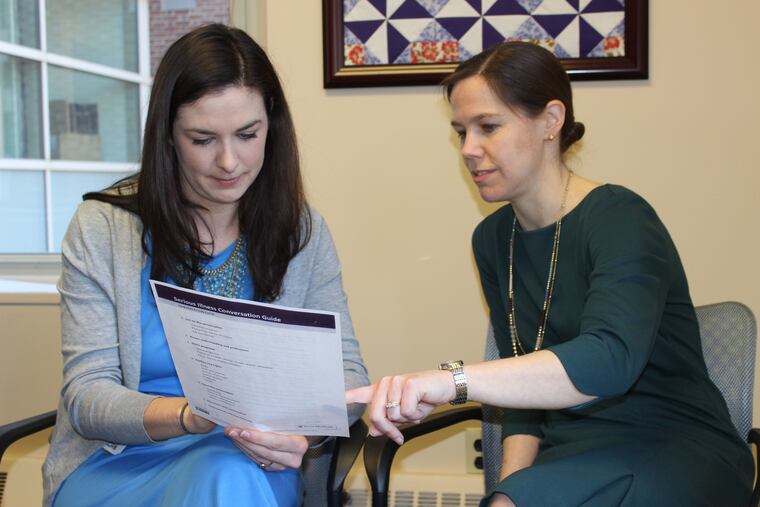Penn Medicine is working with West Philadelphia nursing homes to improve coronavirus care
The program offers help with protective gear and testing, along with addressing deeper questions like, Would you want to go to the hospital?

The coronavirus is strengthening the relationship between Penn Medicine and the West Philadelphia nursing homes that both send it patients and provide post-acute care for people discharged from the system’s hospitals.
The program started in March, when Joshua Uy, a Penn geriatrician who is medical director of Renaissance Healthcare & Rehabilitation Center, asked for help from Nina O’Connor, chief of the Penn health system’s palliative care program. Renaissance had the unfortunate distinction of being the first nursing home in the city to have a patient test positive for the new virus, and Uy was swamped with work as he tried to contain the outbreak.
His first patient, who later died, went to the hospital, but Uy was dismayed after her brother told him, “Not only would she not want to be on a ventilator, she wouldn’t even want to be in the hospital.”
He wanted to be able to provide close attention to residents with the virus who did not want hospital care. Penn stepped in with remote monitoring by palliative care specialists, and offered conversations that could keep families in the loop and help guide decision-making. “One of the really positive things that came out of this was that families could feel that their loved ones were not just being left in a room to die,” Uy said. Five residents who tested positive for COVID-19 died, and Uy suspects that another resident who died had it. Most of the patients in the palliative care program lived.
» READ MORE: How Philadelphia hospitals are protecting the mental health of workers treating coronavirus
Uy said that having extra support from Penn was beneficial for him during a two-week outbreak that felt like two years. (He hasn’t had a new positive case since April 3.) “You can’t get too much help during this pandemic in a nursing home,” he said. “Having this has really been a lifesaver for me.”
As the pandemic spread throughout nursing homes in the city, Penn offered broader assistance to more facilities. O’Connor, who is also chief medical officer for Penn Medicine at Home, said the program is now working with 10 nursing homes in West Philadelphia. It can help with protective equipment, testing capacity, information and training on infection control practices, the same kind of remote palliative care assistance that Renaissance received, and other specialty care.
O’Connor said Penn is not billing for the service.
While area nursing homes have not always been forthcoming about the coronavirus with the public, O’Connor said, she’s seen "a tremendous openness to help.” Some still don’t have enough personal protective equipment (PPE), especially gowns. Access to coronavirus testing remains a problem even as the state and federal governments have encouraged nursing homes to do widespread testing of staff and residents.
» READ MORE: Assume coronavirus is already there, says a Philly nursing home doctor who learned the hard way
The palliative care program grew from recognition that many nursing home patients might not want to go to hospitals, and hospitals are not always the best place for them. For a frail elder, the strain of moving to a new facility can be a stress in itself. In a pandemic, nursing homes might need help clarifying what kind of care many residents would want. Palliative care specialists can help nursing homes provide the best supportive care and monitoring, such as making sure patients are getting enough fluids, and watching for changes in oxygen levels or mental functioning. The program also provides virtual access to social workers and chaplains, who can help family members upset about not being able to visit as well as staff members struggling with the impact of the pandemic. “The staff have bereavement needs and a lot of grief,” O’Connor said.
Susan McCrary, president and CEO of St. Ignatius Nursing & Rehab Center, which is among those working with Penn, said the health system has made it easier to keep sick residents at St. Ignatius. “To try to move, at this stage in their life, may not be the best approach for them,” she said.
Fifty-eight St. Ignatius residents tested positive for the virus and 22 died. It has not had a new positive case since May 5.
» READ MORE: ‘I usually cry in my car’: 3 Philly doctors talk about months of battling coronavirus
During the outbreak, McCrary said, she and her staff have been busy caring for patients. It was a big help to have someone else who could have “those really deep and meaningful conversations with residents and their families.”
Penn also gave St. Ignatius some PPE. “Knowing that [staff] would be protected, that was very comforting,” McCrary said.
O’Connor said the program has improved relationships with area nursing homes, a trend she hopes will continue. “It’s been beautiful to watch that grow,” she said.